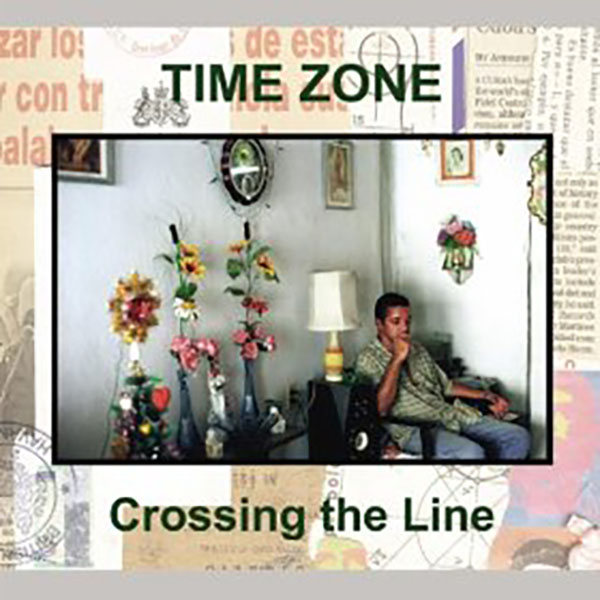
by Ian Mann
December 07, 2011
/ ALBUM
European jazz elements combine with Cuban rhythms to create something distinctive and highly personal.
Time Zone
“Crossing The Line”
(Spherical Records SPR003)
I first became aware of the music of London based trumpeter and composer Loz Speyer back in 1999 when his quartet featuring guitarist Andy Jones, bassist Richard Jeffries and drummer Tony Bianco played on an open air bandstand at the inaugural Leamington Spa Jazz Festival. I was impressed and bought a copy of their then latest album “Two Kinds Of Blue” (33 Records), I guess you don’t need me to tell you who one of the prime influences was.
Fast forward ten years and I reviewed for this site the excellent album “Five Animal Dances” recorded by Speyer’s Inner Space Music, a more improvisatory group featuring Chris Biscoe (reeds), Julie Walkington (bass) and the great Seb Rochford (drums). These two records identified Speyer as an intelligent, highly versatile musician and his latest project, Time Zone, reveals yet another aspect of his musical personality.
Time Zone has its roots in Speyer’s domestic circumstances. His wife, Katiuska is Cuban and Speyer has spent much of the last ten years or so travelling between London and Santiago de Cuba, crossing boundaries but building bridges. “Crossing The Line” is the musical manifestation of these processes with Speyer’s London based band incorporating Cuban elements into their jazz based improvising. Not that Speyer has produced a typically Afro Cuban “party” record. “Crossing The Line” is far more intelligent and serious than that with many of Speyer’s compositions having their origins and inspiration in personal experience. Indeed he achieves a remarkably organic synthesis of the elements that make up Time Zone’s music with the European jazz elements combining with the Cuban rhythms to create something distinctive and highly personal.
Joining Speyer on trumpet and flugel are London based musicians Martin Hathaway (alto sax, bass clarinet), Stefano Kalonaris (guitar and tres), Davide Mantovani (double bass), Simon Pearson (drums) and Maurizio Ravalico (congas and percussion). They begin with “Conjunto” a rich blend of horns and guitar underpinned by the percolating rhythms of a highly accomplished rhythm section. Speyer and Hathaway link up well with both producing pithy solos as well as engaging in absorbing dialogue. Kalonaris adds rock influenced guitar, a good example of the way Speyer brings seemingly disparate elements together and there are also brief snippets of vocals with lyrics referring to the nature of travelling, sung in “coro” by members of the group.
“Lista De Espera” (or “Waiting List”) is autobiographical, a musical account of Speyer’s family becoming stranded in Cuba due to a lack of flights as Speyer fretted in London. Conganista Ravalico helps to give the piece its distinctive Cuban flavour and enjoys something of a feature mid tune. Speyer’s trumpeting is bright and effusive and contrasts well with Hathaway’s dry, slightly acerbic alto. Kalonaris deploys the distinctive acoustic sound of the Cuban tres.
Speyer describes his band as “Bilingual”, also the title of the next tune. Musically it’s a reference to the flexibility of his band members and their capacity to absorb musical ideas from as far afield as Cuba and Eastern Europe. It’s also a reference to his step daughter who came from Cuba to live in London at the age of eleven and has fitted in perfectly “she now moves most easily of all of us between the two worlds”, says Speyer. Musically the piece incorporates urban funk rhythms, grainy bass clarinet and Kalonaris’ metallesque guitar before shifting abruptly to a more obvious Cuban groove with Ravalico and Pearson featuring strongly above Kalonaris’ nagging guitar phrases. It’s the way that Speyer and his colleagues juxtapose these various elements that’s impressive. Bilingual indeed- with the composer having plenty to say for himself in a celebratory trumpet solo.
The percussion led “Snakepath” features Blue Note style horns in a perfect synthesis of Speyer’s jazz and Latin tendencies with sparkling jazz solos coming from Hathaway on alto and Kalonaris on guitar, boppish but with a tantalising trace of the rock elements heard elsewhere. Ravalico’s percussion feature provides the most obvious Cuban component.
“Miracle Maricel” celebrates Speyer’s young daughter in relaxed but joyous fashion with the leader’s warm and effusive flugel solo leading the way. He’s followed by a relatively laid back Kalonaris then by the always immaculate Mantovani with a richly resonant bass solo.
“Fine Line” continues the mood with Speyer again on flugel, the nearest this mostly predominately album gets to a ballad. The highlight is a thoughtful alto solo from Hathaway, skilfully constructed above largely orthodox jazz rhythms.
The closing “International Dateline” incorporates snippets of telephone conversations and related dialling noises plus a monologue from Speyer about the difficulties of conducting a long distance telephone relationship. It’s the lengthiest track on the record and some of this stuff is a little self indulgent and rather overstays its welcome. However if you get bored of listening to Speyer’s list of telephone related complaints there’s some great wailing alto sax from Hathaway to concentrate on and some typically engrossing underlying rhythms. Nevertheless the additional elements entail that for me the piece doesn’t quite match the standards of the rest of this very good album. It probably works much better live-and this is a group that has toured extensively.
Minor misgivings aside this is a very good album that takes a refreshingly original approach to Cuban music. Speyer’s compositions are consistently interesting with their disparate elements and regular twists and turns and the playing from a supremely accomplished band is superb throughout.
“Cross The Line” is a worthy addition to a diverse and intelligent body of work.